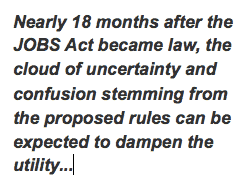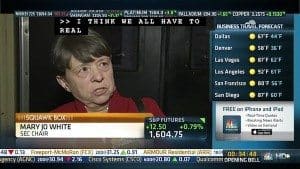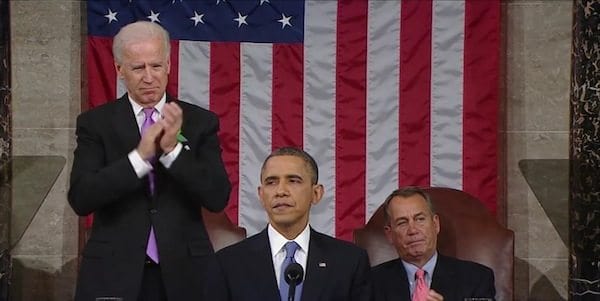 September 23, 2013 kicked off an historic period in federal securities laws. For the first time in 80 years companies would be allowed to publicly solicit investors in unregistered private placements so long as all of the investors were accredited. The SEC did so under orders from Congress pursuant to what is known as Title II of the JOBS Act of 2012, by creating new Rule 506(c). However, the week that started off with a bang ended with a wimper.
September 23, 2013 kicked off an historic period in federal securities laws. For the first time in 80 years companies would be allowed to publicly solicit investors in unregistered private placements so long as all of the investors were accredited. The SEC did so under orders from Congress pursuant to what is known as Title II of the JOBS Act of 2012, by creating new Rule 506(c). However, the week that started off with a bang ended with a wimper.
As I reported on September 26, which was published in Crowdfundinsider on September 27 (It’s the JOBS Act, Stupid! – Still Time to Comment on SEC’s Proposed Regulation D General Solicitation Rules?), I expected the SEC to extend the 60 day comment period for the additional proposed rules relating to the use of SEC Rule 506(c) (PDF), regarding the use of general solicitation and advertising in private placements. The original comment period for the proposed rules had expired on September 23. The proposed rules, if ever enacted in final SEC rulemaking, would place additional limitations on SEC Rule 506(c) which are widely believed to undermine the utility of Rule 506(c). These proposed rules require, among  other things, advance Form D filing requirements, severe penalties for non-compliance with Form D filing requirements, and a requirement that soliciting materials be filed with the SEC no later than the day they are first used. But on September 20, 2013 the SEC received two comment letters requesting that the comment period for the proposed rules be extended: one from the SEC Advisory Committee on Small and Emerging Companies (PDF) and the other from none other than Congressman Patrick McHenry (PDF), the originator of the federal 2012 JOBS Act legislation.
other things, advance Form D filing requirements, severe penalties for non-compliance with Form D filing requirements, and a requirement that soliciting materials be filed with the SEC no later than the day they are first used. But on September 20, 2013 the SEC received two comment letters requesting that the comment period for the proposed rules be extended: one from the SEC Advisory Committee on Small and Emerging Companies (PDF) and the other from none other than Congressman Patrick McHenry (PDF), the originator of the federal 2012 JOBS Act legislation.
In an SEC release published on September 27 (PDF), the SEC announced that it would be “re-opening” the comment period for the proposed rule, extending the comment period for an additional 30 days from the date notice of the extended comment period is published in the Federal Register – effectively extending the comment period by approximately 45 days (exact date to be determined).
 According to the SEC’s September 27 Release:
According to the SEC’s September 27 Release:
“The proposed amendments have generated a large amount of public interest. The Commission believes that providing the public additional time to consider thoroughly the matters addressed by the release and comments submitted to date and to submit comprehensive responses would benefit the Commission in its consideration of final rules.”
One would have expected that after receiving over 300 comment letters, the SEC would have had sufficient input from the public to proceed with consideration of final rulemaking. So the real question is what is behind the comment period extension, and what does this foreshadow for final SEC rulemaking?
And what is unusual is not the extension per se, but one of the reasons given: to provide; “the public additional time to consider thoroughly the matters addressed by the releaseand comments submitted to date . . ..” In other words, the SEC is now soliciting comments not only on their rule proposal, but on the comments on the rule proposals.
 Given the heated debate on these issues thus far, both among the SEC Commissioners themselves (the proposed rule issued on July 10 in a divided 3-2 vote) and among commentators, with state regulators and consumer protection groups in a pitched battle against Wall Street lobbyists, angel investors and the startup community, it seems the SEC is looking for a graceful exit from the proposed rules. It appears the SEC is hoping to find a less intrusive solution to increasing the ability of state regulators and the SEC to monitor new Rule 506(c) – short of requiring measures that would make use of this new Rule impracticable for small issuers (e.g. advance Form D filing requirements, severe penalties for non-compliance with Form D filing requirements, and the requirement that soliciting materials be filed with the SEC no later than the day they are first used).
Given the heated debate on these issues thus far, both among the SEC Commissioners themselves (the proposed rule issued on July 10 in a divided 3-2 vote) and among commentators, with state regulators and consumer protection groups in a pitched battle against Wall Street lobbyists, angel investors and the startup community, it seems the SEC is looking for a graceful exit from the proposed rules. It appears the SEC is hoping to find a less intrusive solution to increasing the ability of state regulators and the SEC to monitor new Rule 506(c) – short of requiring measures that would make use of this new Rule impracticable for small issuers (e.g. advance Form D filing requirements, severe penalties for non-compliance with Form D filing requirements, and the requirement that soliciting materials be filed with the SEC no later than the day they are first used).
And then there is that minor detail of the SEC having one eye on satisfying reasonable expectations of Congress, the same body that must approve the SEC’s operating budget annually – at a time when there is political pressure to shrink the overall government spending pie.
 Congressman McHenry has already presented the SEC with a tall order as to what he expects to come out of the proposed rulemaking – first on July 22 in a scathing six page letter, and then with a pointed two page letter on September 20 (PDF) admonishing the SEC to consider the views of the SBA Office of Advocacy, as expressed in their September 12 comment letter (PDF) – “given its expertise in small business capital formation”, concerns which were first raised with the SEC in my comment letter to the SEC on August 28 and provided to the Office of Advocacy at that time.
Congressman McHenry has already presented the SEC with a tall order as to what he expects to come out of the proposed rulemaking – first on July 22 in a scathing six page letter, and then with a pointed two page letter on September 20 (PDF) admonishing the SEC to consider the views of the SBA Office of Advocacy, as expressed in their September 12 comment letter (PDF) – “given its expertise in small business capital formation”, concerns which were first raised with the SEC in my comment letter to the SEC on August 28 and provided to the Office of Advocacy at that time.
The proposed rules, though useful to monitor general solicitation in private placements, would in the opinion of Representative McHenry and others render Title II of the JOBS Act (and resulting SEC Rule 506(c)) useless as a tool for capital formation by small businesses – an outcome which it appears the SEC now realizes will not withstand either Congressional oversight or judicial scrutiny. Seems that the SEC failed to properly factor in the impact of its proposals on small businesses, or adequately consider alternative measures, as it is required to do under the federal Regulatory Flexibility Act of 1980. The SEC already has a heightened sensitivity to limits on its rulemaking powers under the Administrative Procedure Act as a result of recent court challenges to its rulemaking powers.
Indeed, the inescapable conclusion is that the SEC realized that it had two choices:
- leave the proposed rules substantially intact as final rules and provide an exemption for “small business” (defined under the Regulatory Flexibility Act as companies with total assets of $5 million or less who are seeking to raise no more than $5 million) – an exemption which would effectively gut the effectiveness of the proposed rules in the eyes of consumer groups and state regulators – or
- dramatically soften the proposed rules for all businesses, large or small. Looks to me as if the SEC is taking the path of least resistance – electing to go the latter route – one less likely to inflame key federal legislators or run afoul of federal rulemaking statutes.
 In sum, look for the SEC down the road to re-propose kinder, gentler rules regarding the use of Rule 506(c) to extricate itself from the corner a sharply divided Commission painted itself into, rules which might possibly arrive on the heels of the long overdue Title III proposed equity crowdfunding rules. It appears as if one last minute commentator, the Milken Institute Center for Financial Markets, has already tried to start the ball rolling in this direction in its September 20 comment letter (PDF – below) – for example, by suggesting “a three strikes penalty system for issuers who fail to comply with Form D filing requirements,” rather than the proposed automatic one year mandatory penalty excluding the use of Rule 506. The Milken approach is strikingly similar to the “two strikes” solution I proposed to the SEC in my August 28 comment letter – a solution whose elegance lies in both its simplicity and avoids the need for any new rulemaking by the SEC in this area (unlike the Milken proposal). Milken’s letter does not spell out what the “three strikes” would be.
In sum, look for the SEC down the road to re-propose kinder, gentler rules regarding the use of Rule 506(c) to extricate itself from the corner a sharply divided Commission painted itself into, rules which might possibly arrive on the heels of the long overdue Title III proposed equity crowdfunding rules. It appears as if one last minute commentator, the Milken Institute Center for Financial Markets, has already tried to start the ball rolling in this direction in its September 20 comment letter (PDF – below) – for example, by suggesting “a three strikes penalty system for issuers who fail to comply with Form D filing requirements,” rather than the proposed automatic one year mandatory penalty excluding the use of Rule 506. The Milken approach is strikingly similar to the “two strikes” solution I proposed to the SEC in my August 28 comment letter – a solution whose elegance lies in both its simplicity and avoids the need for any new rulemaking by the SEC in this area (unlike the Milken proposal). Milken’s letter does not spell out what the “three strikes” would be.
The Milken comment letter is certainly one letter that deserves a close look, both by the SEC and other commentators during the upcoming comment period – and many of its points may serve as a springboard for other persons seeking to submit comments during the renewed comment period –both because of certain points made in the letter and the visibility of the Milken Institute. However, as with anything that is the product of a committee (including the JOBS Act), some good points will inevitably be overlooked or perhaps omitted entirely. Look for a supplement to my August 28 SEC comment letter to plug at least one gaping hole in the Milken letter and add some real world context to at least one of its suggestions.
In the meantime, nearly 18 months after the JOBS Act became law, the cloud of uncertainty and confusion stemming from the proposed rules can be expected to dampen the utility of Rule 506(c).
_________________________________________________
 Samuel S. Guzik is a corporate and securities attorney and business advisor with the law firm of Guzik & Associates, with more than 30 years of experience. He is admitted to practice before the SEC and in New York and California. During this time he has represented a number of public and privately held businesses, from startup to exit, concentrating in financing startups and emerging growth companies. He also frequent blogger on securities and corporate law issues at The Corporate Securities Lawyer Blog.
Samuel S. Guzik is a corporate and securities attorney and business advisor with the law firm of Guzik & Associates, with more than 30 years of experience. He is admitted to practice before the SEC and in New York and California. During this time he has represented a number of public and privately held businesses, from startup to exit, concentrating in financing startups and emerging growth companies. He also frequent blogger on securities and corporate law issues at The Corporate Securities Lawyer Blog.
_________________________________________________
[scribd id=171978833 key=key-40b5f4bwt371a1ym9w mode=scroll]

